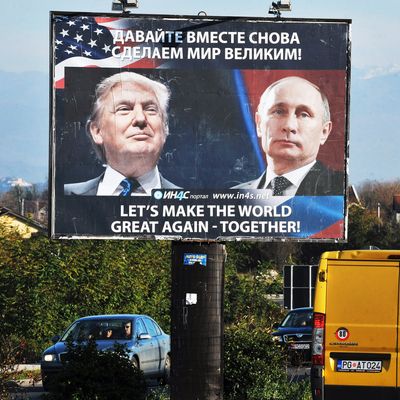
A lot of people in elite circles are quite concerned about Vladimir Putin’s unwholesome interest in U.S. politics, and his avenues for influence in Donald Trump’s Washington. And some Democrats are licking their chops at upcoming opportunities to get some payback for decades of Cold War claims they were soft on the evil Russkies.
There is certainly plenty of raw material for attacks on the Russia-Trump connection. All U.S. intelligence agencies are reportedly now in accord that Russia sought to throw the presidential election to Trump via selected leaks of hacked information. With the campaign over, President Obama seems newly emboldened to draw attention to the issue. And Trump has already poured some gasoline on the flame by choosing a National Security adviser and a secretary of State who have exhibited notable friendliness to Moscow in the recent past.
So could Russia supply the fulcrum for a successful Democratic line of attack on the new administration? Maybe, but there’s a problem: The general public does not seem that interested.
A new Politico/Morning Consult survey this week shows only a third of Americans believe Russia influenced the 2016 elections. Forty-four percent do not think so, and another quarter are unsure. Even removing the hard-core Trump supporters from the equation, that’s a number too low at this point to sustain a lot of outrage aimed at Putin and his government.
Similarly, a recent NBC/Wall Street Journal poll found that only 31 percent of Americans think Trump’s relationship with Putin is “too friendly” or “not appropriate.” And positive attitudes toward Putin among Republicans have been rapidly increasing, limiting the hay that could be made from linking the new president and administration to Vlad.
Add in the traditionally low level of interest Americans have for foreign-policy matters unless the U.S. is in, or about to enter, a shooting war, and you have an issue of dubious salience.
This could all change if even more compelling evidence of Russian interference in our political system emerges, or if Trump really tries to dismantle NATO, or if new wars break out involving Moscow, or perhaps even if the humanitarian disaster in Syria finally becomes lurid enough to attract public attention in the U.S. But for now the Big Scary Russian Bear just isn’t that scary anymore.






























